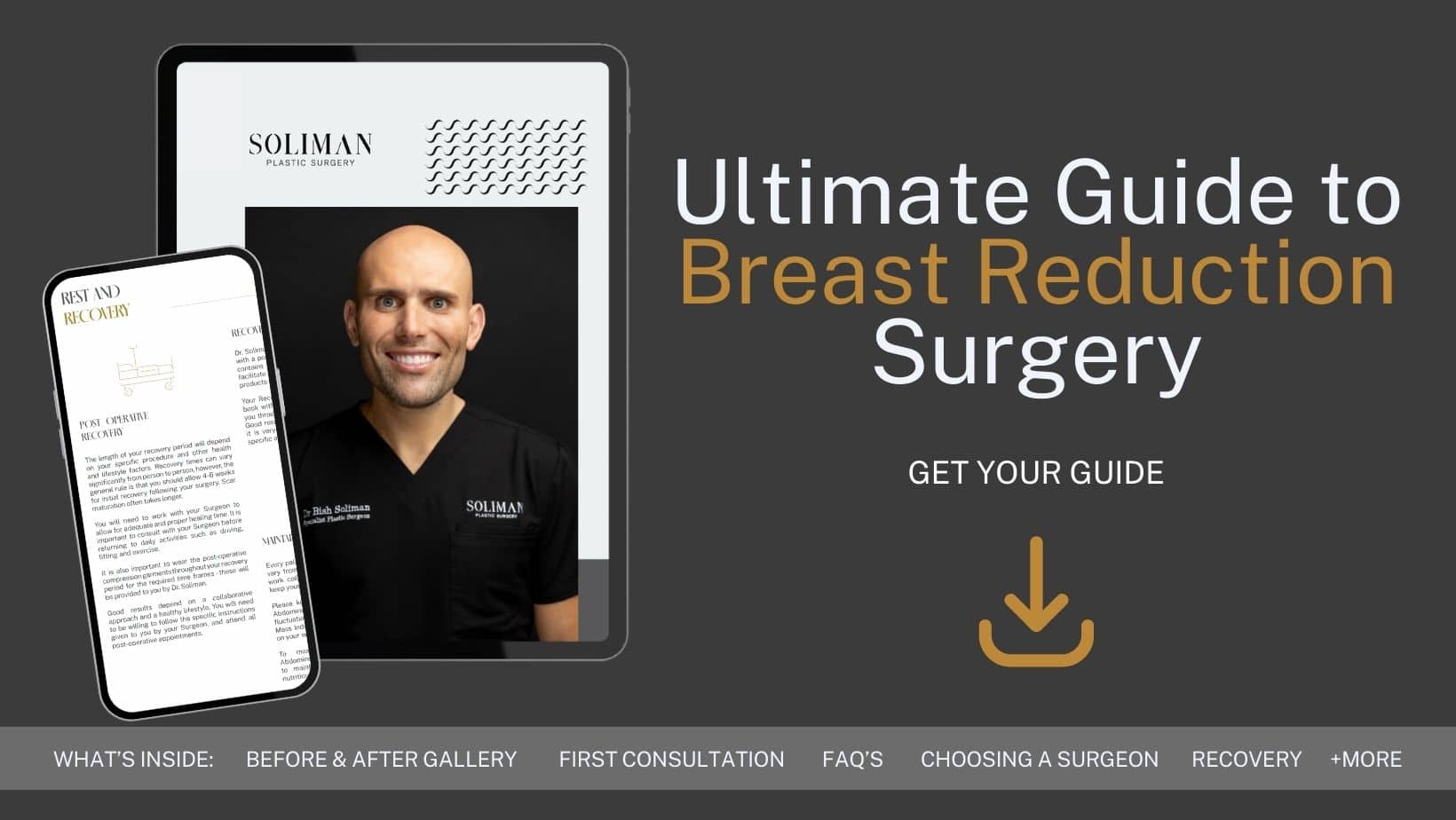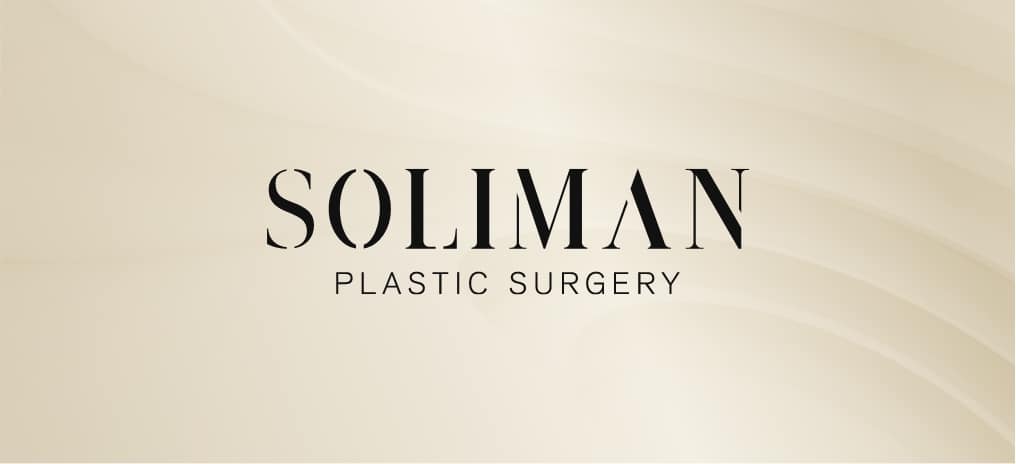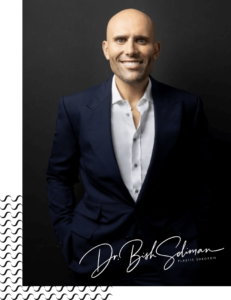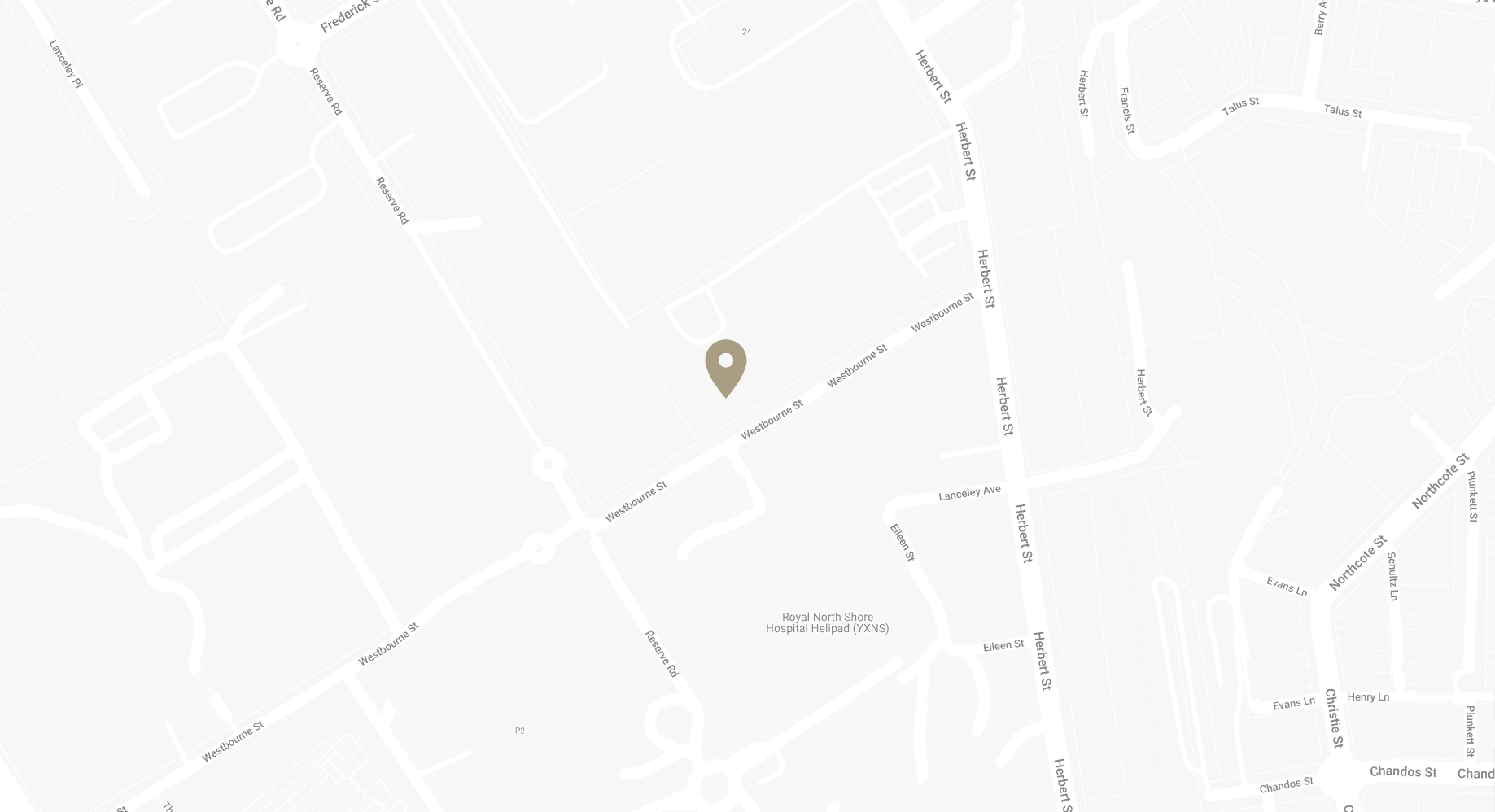Steps to Efficiently Prepare for Breast Reduction Surgery
Breast reduction surgery, or reduction mammoplasty, is a medical procedure that involves the removal of excess breast fat, glandular tissue, and skin to achieve a breast size that is proportionate to your body. It can be a great relief for women who experience physical discomfort due to overly large breasts. However, keep in mind that breast reduction is a significant procedure that requires careful thought and preparation.
In this blog, Sydney Specialist Plastic Surgeon Dr Bish Soliman will discuss the steps to efficiently prepare for breast reduction surgery. These steps can help ensure a smooth procedure and recovery, helping you achieve a good outcome.
Download Dr Bish Soliman Breast Reduction Guide

Top 10 Steps to Prepare for Breast Reduction Surgery
- Consultation and Research: Begin with thorough research and consultations. Understand the procedure, risks, benefits, and the recovery process. Choose a specialist plastic surgeon with experience in breast reduction surgeries. During consultations, discuss your goals, medical history, and any concerns. This is also the time to understand the surgical technique that will be used and the expected outcome. Educating yourself will help set realistic expectations and reduce pre-surgery anxiety.
- Pre-Surgical Medical Evaluation: Undergo a complete medical evaluation as advised by Dr Bish Soliman. This may include blood tests, mammograms, or other imaging studies. The purpose is to assess your overall health and ensure you are fit for surgery. Discuss any existing medical conditions with your surgeon and anaesthesiologist.
- Medication Management: Review your current medications with Dr Soliman. Certain medications and supplements, especially those that can increase bleeding, such as aspirin, anti-inflammatory drugs, and some herbal supplements, may need to be stopped or adjusted. If you’re on any critical medication, your surgeon will coordinate with your primary physician to make safe adjustments.
- Lifestyle Adjustments: If you smoke, it’s important to quit at least six weeks before the surgery, as smoking can significantly impair healing and increase the risk of complications. Limit alcohol consumption and ensure you’re following a healthy diet to boost your immune system. Staying hydrated and maintaining a balanced diet rich in proteins, vitamins, and minerals is essential for optimal recovery.
- Arrange for Assistance: Post-surgery, you will need help. Arrange for a family member, friend, or caregiver to drive you home and stay with you for at least the first 24 hours. It’s also wise to have someone available to help with daily tasks like cooking, cleaning, and childcare in the initial recovery days.
- Prepare Your Recovery Area: Set up a comfortable recovery space in your home. This should include a place to rest with plenty of pillows to keep your upper body elevated. Stock this area with essentials such as water, medications, remote controls, books, or anything else that will keep you comfortable and entertained while you recover.
- Purchase Necessary Supplies: Buy any recommended post-surgical items in advance. This includes items like front-opening shirts (which are easier to put on), special post-surgical bras, gauze, ice packs for swelling, and any prescribed medications. Having these items ready will make your return home more comfortable and stress-free.
- Pre-Surgery Preparations: The night before your surgery, follow Dr Soliman’s instructions carefully. This often includes not eating or drinking after midnight. Prepare your body as directed, which may include showering with a special antibacterial soap. Get a good night’s sleep to ensure you’re well-rested for the surgery.
- Mental Preparation: Mental preparation is as important as physical preparation. Understand that it’s normal to feel anxious or nervous. Engage in activities that relax you, such as reading, meditation, or light exercise, as advised by Dr Soliman. Consider speaking to a counsellor or joining a support group if you feel overwhelmed.
- Post-Surgery Plan: Plan for your post-surgery recovery. Understand the post-operative instructions, which include wound care, activity restrictions, and follow-up appointments. Know the signs of complications, such as infection or excessive bleeding, and have your surgeon’s contact information readily available. Plan your follow-up appointments and ensure you have transportation arranged.
What to Do in the Weeks before Breast Reduction Surgery
In the weeks leading up to your surgery, it’s important to focus on maintaining a healthy lifestyle. This means eating a balanced diet, exercising regularly, getting plenty of rest, and avoiding alcohol and tobacco. These habits can help boost your immune system and promote healing after the surgery.
You should also start preparing your body for the surgery. This might involve losing weight, if recommended by Dr Soliman, and building strength through exercise. Working on your core strength can be particularly beneficial, as this can help improve your posture and reduce strain on your back and neck after the surgery.
Additionally, be sure to follow any specific instructions from your surgeon. For example, you may be asked to stop taking certain medications or supplements that can increase bleeding.
What to do 24 Hours before Breast Reduction Surgery
The day before your surgery is a crucial time for final preparations. You’ll need to follow your surgeon’s instructions carefully to ensure the best possible outcome.
You’ll likely be asked to fast, which usually means no food or drink after midnight. This is to reduce the risk of complications during the surgery. Make sure you stay hydrated up until the fasting period begins.
You should take a shower and wash your hair. You may also be asked to clean the surgical areas with a special soap. Avoid using lotions, creams, or makeup after your shower.
Make sure to prepare a bag with everything you’ll need for your hospital stay. This includes your ID, insurance card, toiletries, a change of clothes, and any medications you’re currently taking.
Mistakes to Avoid When Preparing for Breast Reduction Surgery
When preparing for your surgery, it’s equally important to know what not to do. Avoiding these common mistakes can help ensure a smooth procedure and recovery.
One common mistake is failing to follow Dr Soliman’s instructions. These guidelines are given for your safety and the success of your surgery. Ignoring them can lead to complications and a longer recovery time.
Another mistake is not preparing your home for your recovery. You’ll likely be tired and in some discomfort after the surgery. Having everything you need within easy reach can make your recovery much more comfortable.
Don’t underestimate the importance of emotional preparation. It’s normal to feel a range of emotions in the lead-up to your surgery. However, if you’re feeling extremely anxious or depressed, it’s important to seek help. Your mental health is just as important as your physical health in this process.
Preparing for breast reduction surgery requires careful planning and preparation. By following these steps and avoiding common mistakes, you can set yourself up for a successful procedure and a smooth recovery. Remember to consult with Dr Bish Soliman and his team throughout this process, as they’re your best source of information and support.
FAQs about How to Prepare for Breast Reduction Surgery
What to buy before breast reduction surgery?
- Before undergoing breast reduction surgery, it’s important to prepare by purchasing a few essential items. Comfortable, loose-fitting clothing, especially shirts that button up in the front, will be invaluable post-surgery. Stock up on ice packs or gel packs to help with swelling. Ensure you have plenty of pillows to keep yourself elevated and comfortable. It’s also wise to buy any recommended post-surgical bras in advance. Additionally, consider preparing meals or snacks that are easy to eat and digest, and don’t forget to fill any prescriptions Dr Soliman may provide beforehand.
Can I smoke the day before breast reduction surgery?
- It is strongly advised not to smoke the day before breast reduction surgery. Smoking can significantly increase the risk of complications during and after surgery. Nicotine constricts blood vessels and impairs blood flow, which can affect the healing process and increase the risk of infection. Dr Soliman recommends quitting smoking six weeks before surgery to ensure the best possible outcomes and a smoother recovery process.
When should I start to prepare for breast reduction surgery?
- Preparation for breast reduction surgery should begin several weeks in advance. This time frame allows you to make necessary lifestyle adjustments, such as quitting smoking or managing your diet, to ensure your body is in optimal condition for surgery and recovery. It’s also a good opportunity to arrange for any help you might need post-surgery, such as assistance with daily tasks or childcare. Additionally, use this time to communicate with Dr Soliman about any concerns or questions you have, and to understand and follow their pre-operative instructions.
What not to do before breast reduction surgery?
- Before breast reduction surgery, there are several things you should avoid to ensure a safe procedure and recovery. Do not take blood-thinning medications or supplements, such as aspirin, ibuprofen, or certain herbal supplements, as they can increase bleeding risks. Avoid smoking and consuming alcohol, as they can impair healing and increase the risk of complications. It’s also important not to eat or drink anything, including water, after midnight the night before your surgery, unless Dr Soliman gives specific instructions otherwise. Lastly, avoid heavy physical activity or any new skincare routines that might irritate the surgical area.
How to mentally prepare for breast reduction surgery?
- Mentally preparing for breast reduction surgery involves several steps. First, educate yourself about the procedure, recovery process, and potential risks to set realistic expectations. It can be helpful to talk to others who have undergone the surgery or join support groups. Manage anxiety or stress through relaxation techniques, meditation, or counselling if needed. Organise your life to accommodate your recovery period – this includes arranging for time off work, help around the house, and preparing your recovery space. Make sure to maintain open communication with your surgeon and his team, and don’t hesitate to ask questions or express concerns.
Further Reading about Breast Reduction Surgery with Sydney Plastic Surgeon Dr Bish Soliman
- Read Dr Soliman’s Blog about FAQs about Breast Reduction (Reduction Mammaplasty)
- Read Dr Soliman’s Blog about Medicare for Breast Reduction Surgery in Sydney
- Read Dr Soliman’s Blog about Who Are the Best Breast Reduction Surgeons in the World?
- Read Dr Soliman’s Blog about What Is Scarless Breast Reduction
- Read Dr Soliman’s Blog about Scars after Breast Reduction for Best Results
- Read Dr Soliman’s Blog about Recovery after Breast Reduction
- Read Dr Soliman’s Blog about How to Treat and Reduce Bruising after Breast Reduction
Medical References about Breast Reduction Surgery
- Breast Reduction Preparation – American Society of Plastic Surgeons
- Breast reduction surgery – Mayo Clinic
- Breast Reduction Surgery: An Overview – WebMD
- Breast Reduction: Before Your Surgery – My Health Alberta
- Breast Reduction – Cleveland Clinic



